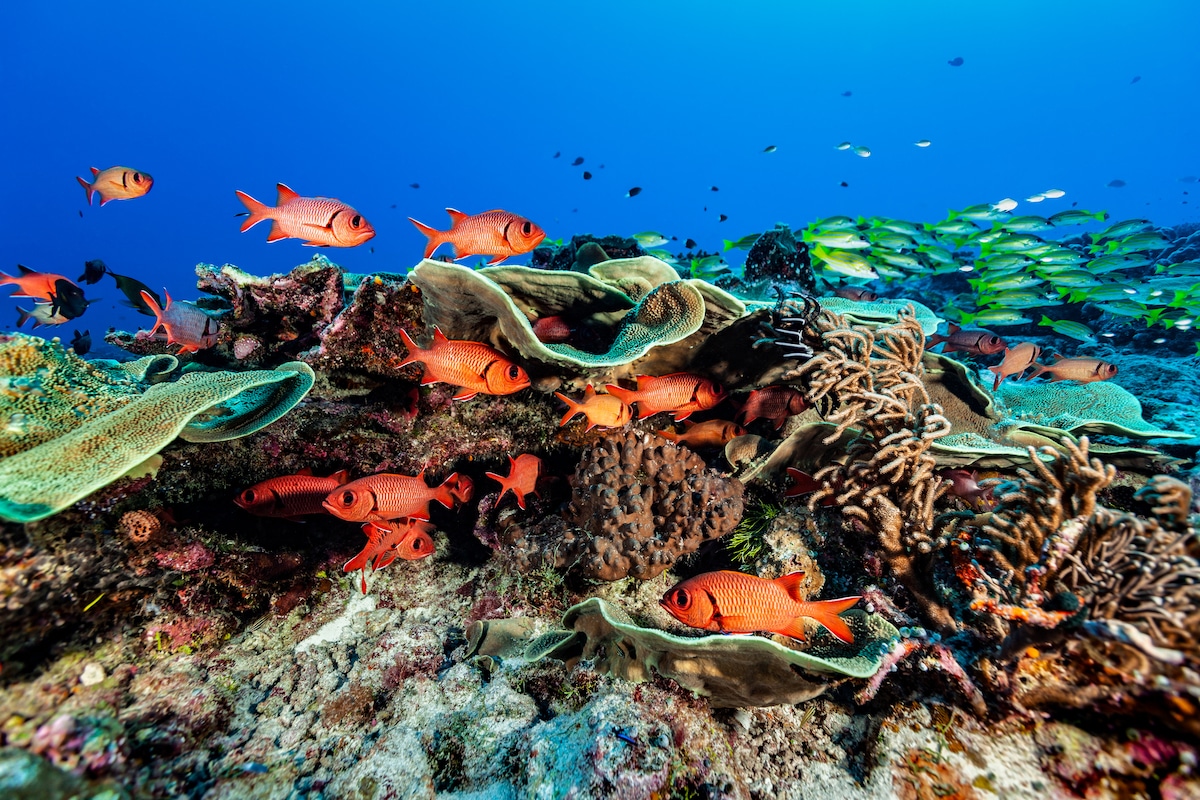Products You May Like
Indo-Pacific corals provide shelter to a variety of fish species in Palau, Micronesia. ifish / E+ / Getty Images
 Why you can trust us
Why you can trust us
Founded in 2005 as an Ohio-based environmental newspaper, EcoWatch is a digital platform dedicated to publishing quality, science-based content on environmental issues, causes, and solutions.
As the climate crisis causes global temperatures to rise and other changes to our environment take hold, corals across the world have been affected. Atlantic Ocean corals are among those that have seen steep declines, while those in the Indian and Pacific Oceans have fared better.
In a new study, an international team of researchers led by The Pennsylvania State University (Penn State) described five new algae species in the symbiodiniacean genus Cladocopium that have a symbiotic relationship with corals. They found that the algae’s associations with Indo-Pacific corals may be more flexible and resilient to warmer ocean temperatures than those with Atlantic Ocean corals.
More From EcoWatch
“The existence of widespread species with the capacity to endure diverse, or variable, environments [is] of importance to ecological and genetic research and conservation. Such ‘ecological generalists’ are more likely to have key adaptations that allow them to better tolerate the physiological challenges of rapid climate change,” the authors of the study wrote.
The study, “Formal recognition of host-generalist species of dinoflagellate (Cladocopium, Symbiodiniaceae) mutualistic with Indo-Pacific reef corals,” was published in the Journal of Phycology.
Coral reefs are made of calcium carbonate that is produced by colonies of coral animals with concentrated populations of algae living within their tissues. The researchers referred to this photosynthetic algae from the family Symbiodiniaceae as “symbionts,” a Penn State press release said.
When environmental conditions like warming ocean temperatures cause the delicate relationship between the coral animals and the algae to break down, it can result in coral bleaching. Depending on the duration and intensity of the stressful ocean conditions, corals can recover from a bleaching event, but it may also result in the death of the colony.
“Coral bleaching not only affects the corals themselves, but also entire ecosystems of organisms — from invertebrates, like sea urchins and spiny lobsters, to vertebrates, like fish and sea turtles,” said Todd LaJeunesse, a professor of biology at Penn State, in the press release. “It’s important to study the biology of corals and their symbionts so we can predict how they will respond to future environmental changes, especially ocean warming.”
LaJeunesse pointed out that not all corals and symbionts have the same response to ocean warming. This is due to the variety of species, each with its own set of characteristics. LaJeunesse said it wasn’t until recently that people began to appreciate how diverse symbiont species were and the important role they play in the resilience of corals.
“Scientists previously lumped all the symbionts into a few broad groups,” LaJeunesse said in the press release. “My lab’s work over the past several years has been to describe individual species of symbiont so we know what we’re dealing with. Without this information, you really can’t adequately study the ecology, physiology and biogeography of corals.”
In their research, the team of scientists found that some symbiont species are specialists and can only have relationships with one or a few coral species, which act as their hosts. Others are generalists and can have many coral species as hosts.
The research team discovered that the Indo-Pacific corals have symbiotic relationships with generalists, while some of the other corals — particularly those from the Caribbean — associate with specialists. Since the Caribbean corals are dependent on fewer species of symbiont, they may be more vulnerable to environmental changes than those in the Indo-Pacific.
LaJeunesse said that, since the symbiont species described by the researchers are essential to so many coral species and coral reef ecosystems covering enormous geographic areas, they “may come to dominate coral communities as Earth’s oceans warm and more sensitive symbionts die out.”
During their study, the research team collected coral samples from reefs in Thailand, the Phoenix Islands, Palau, New Caledonia, Zanzibar of Tanzania and Australia’s Great Barrier Reef. They then extracted the symbionts and identified five species that have the ability to associate with many species of coral hosts by sequencing their DNA.
“It’s difficult to communicate about things we do not know about, or even have a name for,” said Caleb Butler, a graduate student in biology at Penn State and first author of the paper, in the press release. “When we formally describe a species, we are putting a name to these organisms, helping build an identity we can talk about and allow us to connect previous studies with future research. The organisms that we described are widespread, and as oceans warm, these thermally tolerant generalists are likely to expand to new coral communities. Recognizing these distinct species enables informed research into their ecology, and then ability to accurately communicate about the implications of our findings.”
Matthew Nitschke, research scientist from the Australian Institute of Marine Science, said symbionts in the genus Cladocopium are especially biodiverse, but few have been cultured successfully.
“One of species the team described, C. proliferum, can be cultured in a test tube which enables significant progress towards understanding the mechanisms underpinning coral-algal symbiosis, and it has become a model species for such research in Australia. Our Australian team, led by Professor Madeleine van Oppen, are currently using C. proliferum cultures in reef restoration research and development, with a focus on how these algal symbionts contribute to the heat-tolerance of corals,” Nitschke said in the press release.
